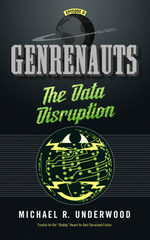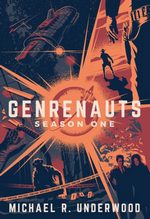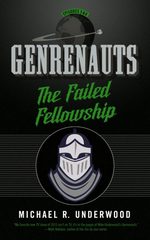 |
The Wasteland Warby Michael R. Underwood E-Book, 53 pg. Read: March 26, 2021 |

The first thing Leah noticed was the dust. It whirled and whorled and danced everywhere. Orange and brown and soot-gray, this place had it all. She pulled the scarf up to cover her nose, holding it in place with her goggles.
She’d felt like a steampunk raver when she’d first put the outfit on, but now it totally made sense, both aesthetically and practically. It was hard to keep your eyes open when they were constantly filled with dust.
What are The Genrenauts?
Many of my readers weren’t reading this blog back in 2015-2016 where it likely seemed I talked about the Genrenauts every couple of weeks (14 posts from November 2015-December 2016, and one the following June), so let me give you a quick idea about the series, taken from the author’s site:
In Genrenauts, our Earth is just one of many in a multiverse. Each other Earth is the home to a familiar narrative genre: Westerns, Fantasy, Romance, Crime, etc. Each world is constantly playing out stories from its genre – archetypes and tale types smashing up against one another making tragedies and happily ever afters. But like any system, sometimes entropy takes hold, and a story breaks down. When that happens, the Genrenauts step in to fix the story.
Because if they don’t, the dissonance from the broken story ripples over and changes Earth on a fundamental level. (Science Fiction world goes off-track and scientific innovation stagnates, exploration halts; Fantasy world goes off-track and xenophobia rises, cultural rifts widen).
Our series starts when Leah Tang, a struggling stand-up comic, is recruited to join the Genrenauts and discovers that her seemingly useless genre savvy is suddenly an essential skill for survival in the story worlds. She arrives just in time, as story breaches have been ramping up – coming faster and causing more ripples.
Sounds great, doesn’t it?
What’s The Wasteland War About?
There are two things going on in this brief novella—first, Angstrom King, the AWOL Team Leader, stumbles upon a story breach while he was trying to resupply his stores. He believes that this breach will help him get evidence to support his theory so that he can eventually convince the High Council that he’s right about the rogue Genrenauts—or just that he’ll be able to find a way to stop the rogues himself.
While he’s trying to understand the nature of the breach and find this evidence, his old team arrives—adding a layer of difficulty and danger to everything he’s doing.
That breach is the second storyline—two communities in this wasteland—one a safe haven for those who need one, and a battleship with resources the other needs—had recently formed an alliance sealed by a marriage. And now, a few months later each side is convinced the other is betraying that alliance and are starting to retaliate against the other.
Hey, Where’s Leah?
Leah’s the point-of-entry character for the reader, we came into this world with her and she’s the one we understand things through. She’s largely sidelined during this mission, which makes it a little harder for me to connect with it. We’ve had extended periods where we focus on others in the team before, but Leah still carried the narrative weight of the novel/novella. This novella focuses so much on King and Shirin that there’s not that much time for Leah.
It was absolutely the right way to tell this story, King and Shireen ought to have been the focus of this novella, but I don’t want that to be the case for too long.
There’s another team member who’s even more absent from this mission—but it makes sense story-wise (as fun as it would’ve been to have them around).
The New Guy
Shirin and King exchanged messages…Shirin keeping King updated on the team and how Mendoza was leading—like a man that only has a hammer and therefore sees nothing but nails.
I know we’re not supposed to like the Team Leader brought in to replace Angstrom King, but it’s like Underwood went out of his way to ensure we wouldn’t. He’s proof that King had a very special thing going on, and that the Genrenauts as an organization might not be as great as Leah and the readers might have thought. King assembled a team with a variety of skills, interests, and abilities—and a team that relies on and trusts each other to function. Mendoza doesn’t value that variety and doesn’t care how it functions best, he’s only concerned with how he wants it to function.
I hope Underwood shows us enough about Mendoza so that we can appreciate him, and maybe even see that he’s trying to do the right thing, even if it’s not the way the King would’ve done it.
On the other hand, I don’t mind not liking the guy at all, so if he doesn’t do that, I won’t complain too loudly.
So, what did I think about The Wasteland War?
Entropy had its teeth in every world. But here, they were serrated.
First, it was so, so, so good to be back in this series. The last episode of Season One came out in the Fall of 2016, and I’ve been missing this series since. I’m glad Underwood has been able to pick this up again.
Outside of the short story, There Will Always Be a Max, this is the shortest Genrenauts episode, and while that’s frustrating because of my greed, it’s a great length for this particular story (but I hope it’s not the beginning of a trend). It’s also a great way to get back into this world—we get just enough to remember who the players are, remember the ongoing arc, and are treated to another adventure in the Wasteland.
Post-apocalyptic wastelands in the Mad Max mold are probably never going to be my thing, but that doesn’t mean I can’t enjoy something like this. I actually would’ve liked a little bit more of the Wasteland War story to balance out the larger arc. It felt like it was given short shrift—not quite as much as the Western World story was in The Shootout Solution, but it was close—although that had to establish the series, introduce the characters, and teach us the concept of a Genrenaut.
My gripes aside, this was a good story with plenty of action and a great atmosphere, and it sets up the rest of Season Two. I’m eager to see where things go from here.

![]()













